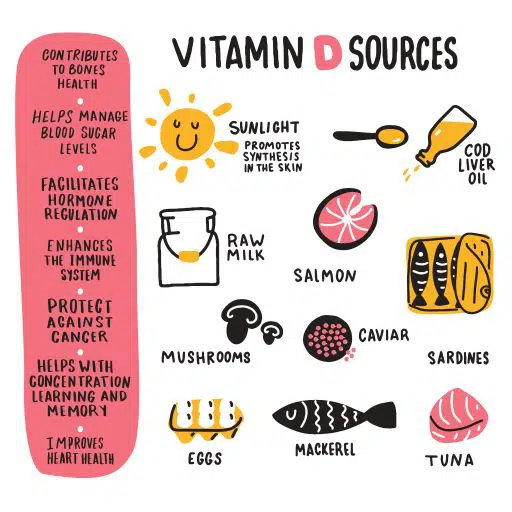Vitamin D, often referred to as the "sunshine vitamin," is essential for numerous bodily functions, including bone health, immune support, and mood regulation. This article explores the diverse health benefits of vitamin D, its natural sources, and foods rich in this crucial nutrient.

Vitamin D plays a critical role in calcium absorption, which is necessary for maintaining healthy bones and teeth. Without sufficient vitamin D, bones can become thin, brittle, or misshapen.
Vitamin D is essential for a properly functioning immune system. It enhances the pathogen-fighting effects of monocytes and macrophages—white blood cells that are critical to immune defense—and decreases inflammation.
Vitamin D has been linked to mood regulation and mental health. Low levels of vitamin D are associated with increased risk of depression and other mood disorders.
Emerging research suggests that vitamin D may play a role in cardiovascular health by influencing blood pressure and heart function.
The body can produce vitamin D when the skin is exposed to sunlight. This is the most natural way to obtain vitamin D.
While few foods naturally contain vitamin D, certain foods are good sources of this nutrient.
Many foods are fortified with vitamin D to help people meet their daily needs.
The recommended dietary allowance (RDA) for vitamin D varies by age, sex, and life stage. For adults, the RDA is:
Higher doses may be recommended for individuals with vitamin D deficiency or specific health conditions, but always consult a healthcare provider before taking supplements.
Vitamin D is crucial for bone health, immune support, mood regulation, and cardiovascular health. Obtaining sufficient vitamin D from sunlight, natural food sources, and fortified foods is essential for maintaining overall health and preventing deficiencies. Regular consumption of vitamin D-rich foods like fatty fish, egg yolks, and fortified products can help meet daily requirements and promote long-term well-being.
Incorporating a balanced diet with adequate vitamin D supports overall health and enhances quality of life by preventing deficiencies and related health issues. Always consult with a healthcare provider before making significant changes to your diet or taking supplements, especially if you have underlying health conditions or dietary restrictions.